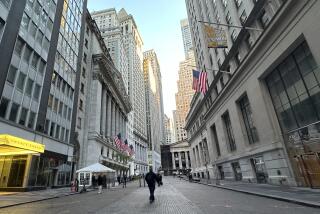CEOs See Bright Economic Outlook for Rest of the Year
- Share via
HOT SPRINGS, Va. — The U.S. economy will show a healthy election-year glow with little risk of recession or inflationary surge, top American business leaders said Friday.
A forecast to the Business Council by analysts for 20 of the nation’s blue chip corporations was far more optimistic than their outlook last October on the eve of the Wall Street crash.
They even predicted a reduction this year in the foreign merchandise trade deficit of more than $20 billion, saying it would fall to less than $150 billion in 1988, compared to the $171-billion deficit last year. Real net exports, the report said, will increase by more than $25 billion in 1988.
The analysis drew no political conclusions from their projections but the bright picture could be expected to help the incumbent Republican Administration.
Chief executives of major firms agreed with their economic consultants that the near-term outlook is rosy. But they expressed continuing concern over the record federal budget deficit and said a slowdown of the growth rate in 1989 is in the cards.
“Business is great in the country right now pretty much across the board,” said Edmund T. Pratt Jr., chairman of Pfizer, the big pharmaceutical company.
“The car business is going great,” added Roger B. Smith, chairman of General Motors, predicting 1988 sales of 15 million cars and trucks.
“Consumer credit card spending is up by 10% to 12% this year and delinquent accounts and charge-offs are down,” Willard C. Butcher, head of Chase Manhattan Bank, reported.
The forecast, presented to the council by Citicorp Chairman John S. Reed, said:
“The U.S. economy continues to grow at a rapid rate, reducing the probability of a major downturn in 1988. Net exports and investment in plant and equipment are growing strongly while government outlays and private consumption are rising more slowly.
“The consultants believe that there is an even chance that the strong expansion will abate somewhat in the coming months. If not, it could produce an unavoidable rise in interest rates and a recession before the end of 1989.”
Specifically, the report said the economy would grow by about 3% this year over 1987, marking the longest period of continuous expansion since the 1960s.
However, the corporate analysts added, a slowdown in growth around the end of this year and the start of 1989 appears to be inevitable as industrial capacity and labor resources are exhausted.
They also forecast an increase of 3.9% in average consumer prices for this year, rising to a 4.6% gain next year. “While inflationary signs in the economy remain muted, the underlying trend suggests that inflationary pressures could emerge over the next few months,” the report said.
Unemployment, which fell to a 12-year low of 5.4% in April, is expected to remain below 6% for the next year, the report added.
The analysts also predicted that interest rates will go up slowly over the next two years, by about one-half a percentage point a year. Despite this trend, they foresaw a further decline in the value of the dollar, helping to reduce the merchandise trade deficit.
On the downside, the housing industry is in a slump, with new starts likely to drop by 8% this year and by the same amount in 1989, according to S. D. Bechtel Jr., chairman of the council and head of the construction firm bearing his name. Spending on industrial plant, however, will rise by 6% this year, Bechtel predicted, before dropping off in 1989.
Commodity prices are going up “very significantly,” Charles W. Parry, retired chairman of Alcoa, warned. He said this often is a precursor of inflation, adding: “I am a little bit worried.” But the overall mood of the business executives, who spoke to reporters at a news conference, was strongly upbeat.
John F. Akers, chairman of International Business Machines, recalled that last October there was widespread concern about the fragility of the U.S. economy in the wake of the stock market crash. “No one is talking about that anymore and that was only six months ago,” Akers said.
Deficits Looming
However, Pratt, the Pfizer chairman, indicated that caution is still advisable for business planners. “Many of us feel we’re living on borrowed time when the underlying economic fundamentals are so questionable,” he said, alluding to big budget and trade deficits as well as the recent wave of corporate takeovers.
James D. Robinson III, chairman of American Express, said the falloff from the Wall Street crash was still being felt. “Consumers are spending actively and traveling but investing very cautiously,” he reported. “There is little joy in the retail brokerage business.”
Robert D. Kilpatrick, chairman of Cigna, an insurance giant, said the federal budget deficit--estimated at $154 billion for the next fiscal year--is the major economic problem facing the United States.
More to Read
Inside the business of entertainment
The Wide Shot brings you news, analysis and insights on everything from streaming wars to production — and what it all means for the future.
You may occasionally receive promotional content from the Los Angeles Times.










